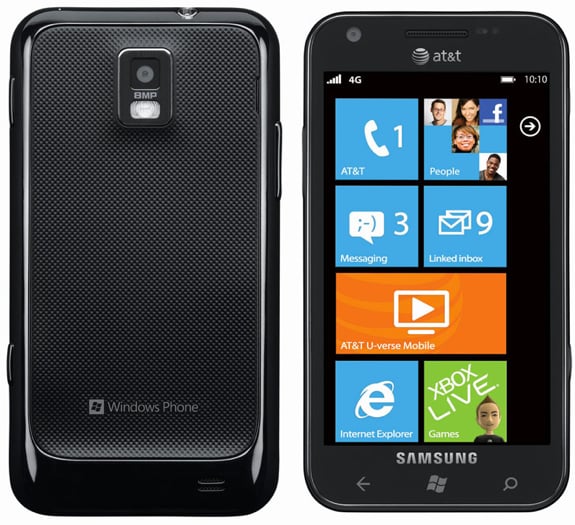Find Our Latest Video Reviews on YouTube!
If you want to stay on top of all of our video reviews of the latest tech, be sure to check out and subscribe to the Gear Live YouTube channel, hosted by Andru Edwards! It’s free!
Thursday December 15, 2011 6:45 pm
Samsung Focus S review: The best Windows Phone in the US
When we first reviewed the Samsung Focus Flash, we felt its smaller form factor and significantly lower price made it a better deal than the Focus S at first glance ($199.99 - $19.99 on Amazon). Now that we've tested the Focus S, we're singing a different tune. True, you're only getting a bigger screen, an improved camera, and a thinner profile, but the Focus S brings Windows Phone 7.5 Mango closer than it has ever been to the high-end. That alone makes this smartphone worth a close look, especially given its slick OS. Click on through to see why in our full Samsung Focus S review.
Design, Call Quality, and Apps
The Focus S measures 5.0 by 2.6 by 0.3 inches (HWD) and weighs just 3.9 ounces; those depth and weight figures lead the class. Like most touch screen Samsung phones, the Focus S is made entirely of plastic. It feels a little cheap, but it's also thinner and lighter than just about any comparable phone. The 4.3-inch, 480-by-800-pixel Super AMOLED Plus is now standard issue for Samsung smartphones; you get vibrant color and deep blacks. Typing is easy in both portrait and landscape modes, and Microsoft's on-screen keyboard is easy to use.
The Focus S is a quad-band EDGE (850/900/1800/1900 MHz) and tri-band HSPA+ 14.4 (850/1900/2100 MHz) device with 802.11b/g/n Wi-Fi. Reception is average and voice quality is mixed. Calls generally sound good in the earpiece, but voices sound computerized through the mic. On a windy day, the Focus S let through a ton of wind noise. Calls sounded fine through an Aliph Jawbone Era Bluetooth headset ($129, 4 stars) and voice dialing worked perfectly. The speakerphone sounds thin and brittle, but sufficiently loud for outdoor use. Battery life was disappointing at just 4 hours 29 minutes of talk time; blame the extra-thin design for the reduced cell capacity.
The single-core Qualcomm MSM8255 S2 1.4GHz processor keeps things moving at a good clip. This phone felt exactly the same as the Focus Flash in testing, which is to say, responsive and intuitive. Windows Phone 7.5 (Mango) is a fun OS with smooth animations, deep social networking integration, and a unique tile-based interface that shows you plenty of real-time information at a glance. There are also over 40,000 apps in Windows Phone Marketplace; it's still missing some major apps, but there's real selection now.
On the other hand, Microsoft's stringent specifications for WP7.5 explain the phone's omissions: a dual-core processor, 4G data speeds, a higher screen resolution, and a memory card slot are all nowhere to be found. I approve of Microsoft's hardware button limitations, and keeping a lid on resolution choices is much better for third-party app compatibility than Windows Mobile ever was. But now that Microsoft finally has a solid code base to work with, it should let its hair down a little in order to catch up to Android. (All indications are that Microsoft is finally getting the message.)
Multimedia, Camera, and Conclusions
There's a standard-size 3.5mm headphone jack on top of the phone and a roomy 16GB of internal storage. There's no microSD card slot, but Microsoft's sync software, available for both PCs and Macs, is easy to use and syncs iTunes playlists reliably in addition to other media. The Zune-based music player app is a beauty, with its compelling album art animations, band photos, and transparent interface. Music tracks sounded fine through Samsung Modus HM6450 Bluetooth headphones ($99). Standalone videos looked fantastic on the AMOLED display, and played at resolutions up to 720p.
The 8-megapixel camera includes auto-focus and an LED flash. Test photos look decent overall. There's a bit too much grain and a slightly overexposed look indoors, but they're fine otherwise. Recorded 720p (1280-by-720-pixel) videos played back smoothy and averaged 29 frames per second, but are hampered by the same issues that plague the still images. VGA recordings (640-by-480-pixel) pegged the frame rate at a solid 30 and looked sharper and better balanced, thanks to the high data transfer rate. You also get a 1.3-megapixel front-facing camera for video chats.
The Samsung Focus S is the closest Microsoft has ever come to hitting high-end, at least since Windows Phone 7 first hit the market late last year. It's the best Windows Phone right now, but it costs too much, as it's still several leagues behind top-end Android devices. For example, the Motorola Atrix 2 ($99.99, 4 stars) offers a dual-core processor, a higher resolution screen, HSPA+ 21 data speeds, and the ability to run hundreds of thousands of third-party Android apps, all for $100 less up front. The Samsung Galaxy S II Skyrocket ($249.99, 4.5 stars) is our current Editors' Choice on AT&T; it adds true 4G LTE data speeds, a 1080p video camera, and a faster 1.5GHz dual-core processor for only $50 more than the Focus S.












